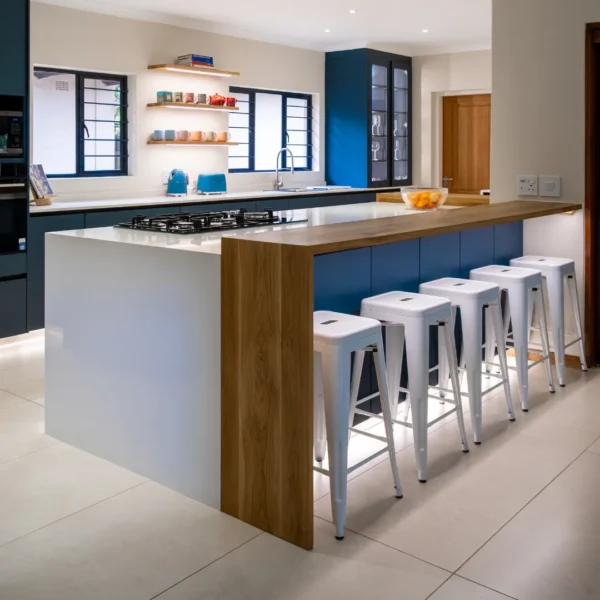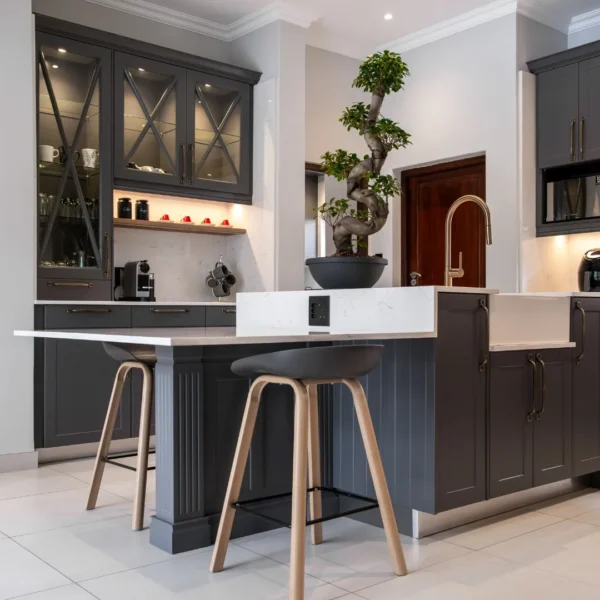The Difference Between Quartz Countertops (Engineered Stone), Sintered Stone (Porcelain Countertops) and Granite Countertops
Choosing the right countertop is a crucial decision in any kitchen renovation. With so many options available, it can be challenging to understand the differences between materials like quartz countertops (engineered stone), sintered stone (as known as porcelain countertops), and granite. At Easylife Kitchens, we’re here to help you make an informed decision by breaking down the key differences in terms of composition, durability, aesthetics, and maintenance.
Quartz Countertops (Engineered Stone)
Quartz countertops are a type of engineered stone made by combining roughly 90–95% crushed natural quartz with resins, pigments, and polymers. This manufacturing process creates a highly durable, non-porous surface that offers both beauty and practicality. Brands such as Lifestone, Caesarstone, Silestone, and ProQuartz fall into this category and are known for their quality and design options.
Key Benefits of Quartz / Engineered Stone:
- Non-porous: Resistant to stains, bacteria, and moisture.
- Low maintenance: No sealing required.
- Wide range of colours: Consistent and customisable patterns, from subtle neutrals to bold designs.
- Uniform appearance: Offers a consistent look without natural imperfections.
- Highly durable: Scratch, chip, and heat resistant.
Quartz and other engineered stone surfaces are popular choices in modern kitchens due to their clean look, variety, and ease of maintenance. The performance depends on the materials used and the manufacturing quality, so always consult with a professional – like our Easylife Kitchens Design Consultants – to find the best fit for your lifestyle.
Sintered Stone (Porcelain Countertops)
Sintered stone, often referred to as porcelain, is a next-generation surface made by fusing natural minerals under intense heat and pressure, without the use of resins. This creates an ultra-compact, non-porous, and highly durable surface.
Key Benefits of Sintered Stone / Porcelain:
• Heat resistant: Can withstand hot pots and pans directly on the surface.
• UV resistant: Colour won’t fade, even in sunlight – ideal for indoor and outdoor use.
• Hygienic: Non-porous surface resists bacteria, stains, and mould.
• Sustainable: Made entirely from natural materials.
• Minimal maintenance: Requires no sealing or special upkeep.
- Note: While sintered stone is incredibly durable, it does require specialised fabrication, can be prone to edge chipping, and is difficult to repair if damaged — making expert installation essential.
Sintered stone is perfect for those looking for exceptional performance and a sophisticated, architectural finish. Its technical properties make it one of the most advanced options available today.
Granite Countertops
Granite is a 100% natural stone cut from quarries, polished, and installed in large slabs. Each piece of granite is unique, featuring natural variations in colour, pattern, and veining.
Key Benefits of Granite:
- Natural beauty: No two slabs are the same.
- High heat resistance: Ideal for placing hot pots and pans.
- Long-lasting: With proper sealing, granite can last for decades.
Granite requires regular sealing to maintain its resistance to stains and bacteria. It’s a popular choice for traditional and rustic-style kitchens, offering earthy charm and timeless appeal.
Which Should You Choose?
Your ideal countertop depends on your needs, budget, and personal taste. Quartz and engineered stone are perfect for low-maintenance, modern kitchens, while granite offers unmatched natural beauty for those who appreciate uniqueness and don’t mind a bit of upkeep.
At Easylife Kitchens, we offer expert advice and premium countertop options to suit every kitchen style. Visit one of our more than 40 showrooms across South Africa and let our experienced design consultants help you find the perfect surface for your dream kitchen: https://www.easylifekitchens.co.za/showrooms/



